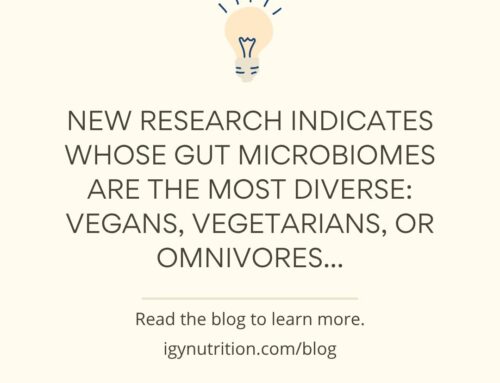If you’re a gut health geek, you may have heard about probiotics and prebiotics. But what about postbiotics?
Postbiotics are beneficial compounds that are produced when probiotics metabolize prebiotics. Let’s check out some of the new science out there.
A Brief Refresher on Dysbiosis
Millions of microbes—bacteria, yeast, fungi—inhabit our bodies, which collectively form the microbiome. These microbes live in our gastrointestinal (GI) tract, aptly named the ‘gut microbiome’ (Source).
While the idea of tiny organisms living inside us might initially seem unsettling, these microbes play essential roles in maintaining our health. They aid in nutrient absorption, metabolism regulation, immune system support, and more (Source).
However, not all of our microscopic inhabitants are friendly. Some can cause harm by damaging our gut lining, promoting inflammation, disrupting metabolism, hormonal balance, immune function, and even mental health.
The presence of too many harmful microbes and too few beneficial microbes living in the gut can result in dysbiosis. Such an imbalance in the gut microbiome is often considered the root cause of many digestive health issues, including those experienced weeks after food poisoning (Source).
So, where do probiotics, prebiotics, and postbiotics come into play?
What are Probiotics, Prebiotics, and Postbiotics?
Prebiotics feed helpful microbes. They are the types of compounds our good guys love to eat. Prebiotics can be found in foods but also come concentrated in supplement form (Source).
Probiotics are helpful microbes. Once consumed, they may help other probiotics secure dominance in the microbiome. While in the GI tract, probiotics may also confer helpful microbe benefits, such as vitamin absorption and immune response (Source).
When probiotics are fed by prebiotics, they generate compounds that may benefit our health. We refer to them as “postbiotics.” These compounds could be short-chain fatty acids (SCFAs), peptides, and other metabolites (Source). We’ll talk more about what they do below.
The Benefits of Postbiotics
Preliminary research has shown that postbiotics benefit our gut health in several ways. One of their primary roles is supporting the integrity of the gut barrier, which is critical for preventing harmful substances from entering the bloodstream (Source). Check out our blog on leaky gut syndrome to learn more about the gut barrier.
These compounds also play a crucial role in modulating the immune system, helping to reduce inflammation and improve the body’s response to infections (Source).
Some research asserts that postbiotics may also retroactively support the probiotics once produced, in turn supporting the prevalence of probiotics in the gut microbiome. More research is needed to solidify this claim.
Postbiotics may also support the gut-brain axis by supporting the production of neurotransmitters like serotonin and dopamine, which may regulate mood and emotional well-being (Source). We know a healthy gut is related to a healthy mind, but more research on postbiotics’ specific relationship to mental health is needed.
Incorporating Postbiotics into Your Diet
By consuming prebiotics paired with fermented food or supplemented probiotics, postbiotics will go to work in your gut. But you may also choose to take it up a notch by supplementing with postbiotics like SCFAs to pack an extra punch. We always recommend talking to a healthcare provider before beginning a course of supplements.
The Takeaway: Postbiotics Support Gut Health
Probiotics are beneficial microbes, prebiotics feed the probiotics, and postbiotics are helpful compounds that are produced as a result. Preliminary research suggests that postbiotics regulate the immune system, improve gut barrier integrity, and support mental health. Scientists are learning more about your gut health and how to support it best every day. Supplementing your diet with pre- and probiotics may supply you with adequate amounts of postbiotics, but you may choose to supplement with them if needed.





This is a very good tip particularly to those new to the blogosphere.
Brief but very precise info… Thank you for sharing this one.
A must read article!
Thank you so much